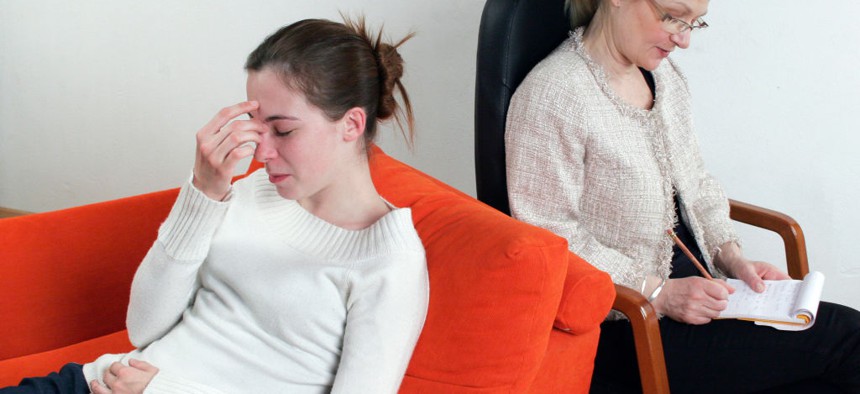Opinion: Extending a common-sense solution to the city’s mental health crisis
Lawmakers have the opportunity to renew legislation that addresses the state’s clinician shortage

BSIP / Contributor
As flowers bloom and the sun shines down on springtime in the city, it’s easy to think that we have put COVID-19 behind us. While the virus may no longer have the devastating visible toll it once did, its invisible impact on the mental health of New Yorkers remains as powerful as ever.
The depression and anxiety the pandemic has left in its wake, most notably among young people, is well-documented. Untold numbers of families are still processing the death of family and community members, the loss of a job, or the closing of a business. We see this every day among the 43,000 New Yorkers of all ages The Child Center of New York serves annually.
Our clients are among the huge numbers of New Yorkers who need mental health support. Unfortunately, care providers across the city and state, especially those who work with low-income folks and immigrants, are finding a debilitating shortage of clinicians—particularly those who speak languages other than English. It’s a huge obstacle to getting people the diagnosis and treatment they need. This was true before the pandemic, and now it has reached a crisis point.
Fortunately, the Legislature has a bill in front of them that could change this with the stroke of a pen (A6008-D by Assembly member Harry Bronson and S5301-B by Sen. Samra Brouk).
Right now, dozens of Licensed Mental Health Counselors (LMHCs), Licensed Marriage and Family Therapists (LMFTs), and Licensed Psychoanalysts (LPs) provide critical clinical care at The Child Center every day. They conduct therapy sessions, manage cases, and know what their clients require to heal.
But despite years of training and experience, currently under state law these professionals cannot officially issue diagnoses—only Licensed Clinical Social Workers (LCSWs) can. It is frustrating, because the difference between the LMHCs/LMFTs and LCSWs is a very technical, hair-splitting issue.
LMHCs, LMFTs, and LPs have years of academic study and clinical training under their belts, just like LCSWs do. They support their clients’ mental health issues across the lifespan, just as an LCSW does. They should be able to diagnose and develop assessment-based treatment plans, just as LCSWs do.
We know the state agrees, because several years ago it instituted an emergency exemption to these restrictions in settings like The Child Center so that our LMFTs, LMHCs, and LPs would have the flexibility they need to deliver care. But that exemption expires on June 24. Unless the legislature passes the current bill, many of our clinicians’ hands will once again be tied.
If the bill is passed, many more New Yorkers will get the mental health services they need and deserve, sending positive impacts rippling through communities. People will have better access to the treatment they need to work through the trauma of recent years in the skilled and compassionate care of a professional – as opposed to potentially ending up in a psychiatric emergency room or the criminal justice system, suffering in silence, or worse.
With the help of a professional, New Yorkers can develop the tools and resiliency to meet the goals they set for themselves and thrive. Their clinicians will be given the respect and dignity they earn through the hard work they do every day, and New York will finally join 32 other states that have already recognized these benefits and granted this ability to diagnose.
LMHCs, LMFTs, and LPs want to be a part of the solution to meet the increasing demand for mental health services—and they are qualified to do it. The state should let them do what they do best.